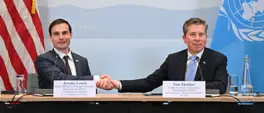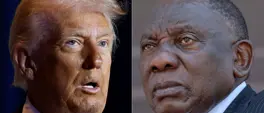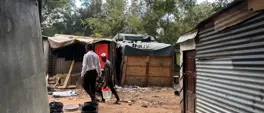MANDY WIENER: Who holds the balance of power in the GNU?
Mandy Wiener
21 June 2024 | 4:25A Government of National Unity was never going to be easy. One week after its announcement, and that fact is becoming patently clear.
One week into the Government of National Unity and already the cracks are emerging, before a Cabinet has even been announced.
We always knew it would be difficult to keep the dream alive, but it took just a few days for the sheen to come off the deal.
The markets are still loving the GNU with the Rand breaching R18/$ mid-week. But public squabbles and undermining of parties are eroding that confidence.
Questions are now arising about who holds the balance of power as President Cyril Ramaphosa must decide, in consultation with other GNU party leaders, who to include in his Cabinet.
As things stand, the sixth administration is no longer in effect. This means he is the Minister of Everything until he appoints a new cabinet.
The composition will be the first real challenge he faces after his inauguration.
He will need to keep the ANC’s tripartite alliance partners satisfied by including representatives from the unions and the SACP. He will then also have to find space in an already bloated cabinet for the GNU parties’ candidates.
It remains to be seen whether the DA and IFP will be allocated key portfolios and whether these could translate into tangible change in policy and delivery. The DA is intent on securing at least five Ministerial positions, if not more. The ANC won’t want to give away too many.
There are now seven members of the GNU with the FF+ announcing its arrival on Thursday night. If all members receive positions, that will mean an even more overweight cabinet.
The Statement of Intent between the GNU parties has now become crucial.
Ramaphosa must consult member parties in appointing his executive. “Whilst recognising the President’s prerogative to appoint Members of the Executive, such appointments should be done in consultation with the Leaders of the respective Parties of the Members considered for appointment,” reads the agreement.
Ramaphosa and DA leader John Steenhuisen are scheduled to meet on Friday to discuss this.
The phrase 'sufficient consensus' has become critical, with the ANC and DA interpreting it differently.
According to the signed agreement, sufficient consensus exists when:
- All parties have had the opportunity to express their views
- Despite reasonable attempts to resolve disagreements, and find common ground, there is no consensus
- Parties to the GNU representing 60% of seats in the National Assembly agree and
- Any party that disagrees has been able to formally record their objections.
The disconnect has been over that 60% number and what it means with the DA’s Helen Zille and the ANC’s Fikile Mbalula disagreeing.
Technically, the legal standing of this document doesn't trump the Constitution. So, the President could just go ahead and do whatever he likes but then the GNU falls apart and he will face a vote of no confidence in Parliament. He will have to stick to it.
Also, the Constitution doesn't allow for a second Deputy President to be appointed which means he won't be able to do that.
The composition of the Cabinet will likely tell us where the balance of power truly lies in the GNU.
It may be overly simplistic to conclude who has emerged as a ‘winner’ in these negotiations. Views differ about whether Zille and her team strategically outwitted the ANC or whether the ANC came off with the better deal.
The ANC, with 40% of the national vote, holds the position of President, Speaker of the National Assembly and Premier in seven provinces. Not bad.
But if the DA walks away from the GNU, the agreement folds and the markets tank. This could be determined by how many cabinet positions it receives. That would demonstrate true power in the sense that it would give the party the ability to effectively deliver services and implement policy.
Business Day is reporting that the ANC is likely to retain Enoch Godongwana as Finance Minister. TimesLIVE understands the ANC’s top brass has called for continuity in key portfolios such as in the economic cluster.
In his inauguration address at the Union Buildings on Wednesday, President Ramaphosa acknowledged the need to work together and reach compromises.
“Understanding that no party can govern alone and make laws alone, these parties have agreed to work in partnership, to employ their talents for the good of the country and the progress of its people,” said Ramaphosa.
“We must reject every attempt to divide or distract us, to sow doubt or cynicism, or to turn us against one another ... Those who seek to undermine our institutions will fail because democracy lives in the hearts of our people and will never be dislodged,” added the President.
But despite this, the fight for the balance of power in the GNU is already starting to cause it to crumble.
The DA loudly protested about the Patriotic Alliance’s inclusion in the GNU without it being consulted first.
Speaking at the Union Buildings, Steenhuisen said that they needed clarity on the interpretation of the agreement.
“The original agreement made it clear that parties would be added only with consultation. We have not been consulted about the PA and their role is not yet clear,” said Steenhuisen.
“I am sure when we sit down with the president in the next 48 hours, that will become clearer. It is time for us to set aside petty partisanship that we saw during elections. We all wore different party T-shirts. The T-shirt we now need to wear is one with the SA flag and the party logo at the back of it,” he explained.
The PA is accusing the DA of trying to ‘boss the room’ by arrogantly claiming to be the anchor party of the GNU. It also wants a substantial ministerial position.
Ramaphosa is going to find it nearly impossible to keep everyone happy.
If the GNU is going to work, all the parties are going to have to learn to play nice, share and not fight in public.
Get the whole picture 💡
Take a look at the topic timeline for all related articles.
Trending News
More in Politics
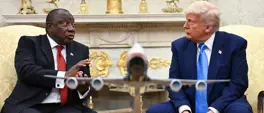
29 December 2025 11:10
From ICJ disputes to trade tariffs: Inside the widening gulf in SA-US diplomacy

20 December 2025 06:26
SADTU sounds alarm: Rising student violence driving teachers out of the profession
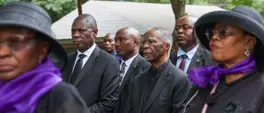
20 December 2025 06:07
‘South Africa is in serious problems’: Thabo Mbeki pays tribute to late advisor Titus Mafolo

